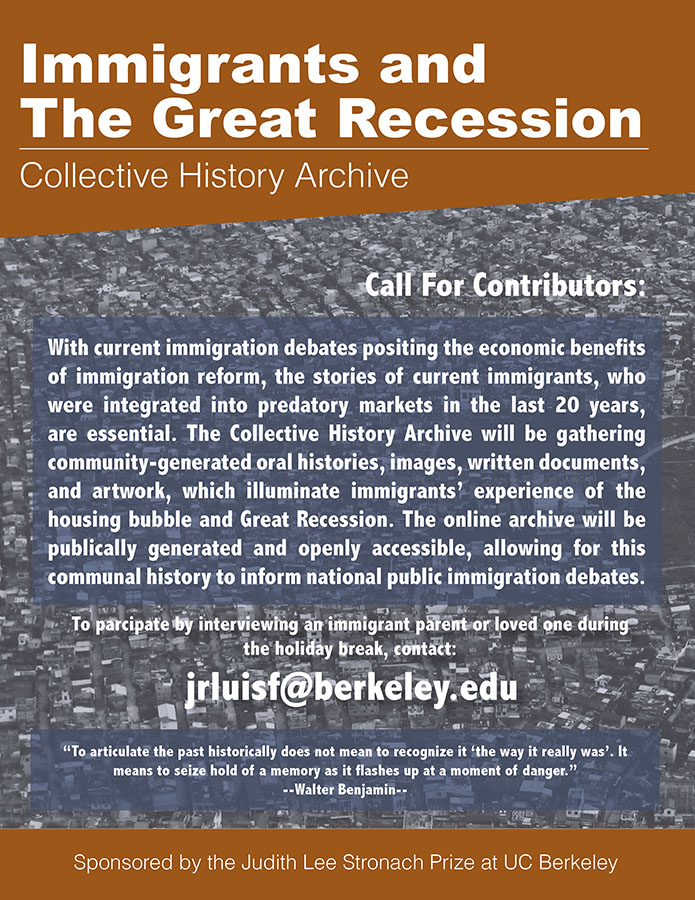BERKELEY – What is “public” about a public history? Is it that these historical narratives chronicle marginalized rather than elite stories? Is it that these types of stories can be publically available, on a website or public library, for anyone to access? Or is it, perhaps, that the goal of this type of history is to engage the public and enable social participation? I think all three. It is my hope that readers of this article will contribute to this effort of collecting a community-generated story archive of the immigrant experience of the great recession. The archive will include oral histories, photographs, artwork, or multimedia works that illuminate this neglected, but timely, recent history.

Collective history archive.
Based out the University of California, Berkeley, I’m working on a yearlong research and advocacy project on immigrants and the Great Recession. Since immigration debates have heated up nationwide, arguments on both sides of the aisle revolve around the economic impact of immigrants.
Progressive organizations, in particular, promote immigrant integration as a type of economic stimulus. “Immigrants make up just 16 percent of the United States population, but they are expected to make up 35.7 percent of homeowners by the year 2020,” reassured ThinkProgress.org, adding that the “the financial stability and purchasing power that comes with immigration reform would allow foreign-born homeowners to fully assimilate into American society.”
This perspective that sees immigrant integration strictly in economic terms ignores the recent history of immigrants’ predatory integration into the housing bubble. Immigrants were not only among the first to feel the ripples of the housing crash, but the predatory subprime market fueling the housing bubble aimed precisely to “integrate” marginalized communities into credit markets.
What my project hopes to do is to uncover this history of predatory immigrant integration and of immigrants experience of the recession to suggest that social engagement, not financial participation, should form the basis of immigrant integration in the U.S. moving forward.
How can you participate?
Over the upcoming holiday break I’m working with students groups in campuses across California to get students to collect the oral history of their immigrant parent’s story. The conversation would take approximately an hour.
What is an oral history?
An oral history is simply a recording or transcript of a person telling a story, sometimes a life story, but often of their experience of a particular event or historic movement.
What do you need?
1. A parent, friend, or loved one who immigrated in the last 20-30 years and became involved in the housing bubble (by refinancing, buying a new home in the 1990s and 2000s, and/or was foreclosed on during the recession).
2. A recording device. A smart phone with a recording app should suffice. The standard “voice memo” app would work, but if you’re looking for better quality recordings, you can download the free “Blue FiRe” app. You can also use a recording app on your computer (Garageband for Apple computers). If you have technical questions about how to record, contact me and I will send you a step-by-step guide to using a particular recording app.
3. Pen and paper, if you want to take notes.
4. A quiet and comfortable space where you and your loved one can talk in a conversational manner without distractions for approximately an hour.
What will happen to the stories?
The recordings, anonymous or not, English or Spanish language, will first be transcribed and translated by the team in Berkeley. After enough content is generated, the archive will be organized in an interactive and open-access website. Our goal is make these sources available to op-ed writers, journalists, activists, and immigrants themselves who can use this collective history to make new political claims. When the website is live, there will be a contributor function that will allow visitors to the site to contribute new content, anonymously or not.
It is my hope that this will be not only an opportunity to expand a political conversation on immigration, but that it will help my generation critically reflect upon how our parent’s history may be repeating itself. Our transition into lives of credit dependency, brought upon by our dependency on student loans, dangerously mirrors our parent’s participation in predatory mortgage markets.
I’m sure the community of journalists and storytellers at Borderzine.com agree that our community’s social struggle is also a struggle to produce our own histories, outside the common frames of “illegality” and “irresponsibility.” Please join me in sharing our parents’ stories.
For a template of conversation questions and a more detailed explanation of the project, contact Luis Flores at jrluisf@berkeley.edu.


